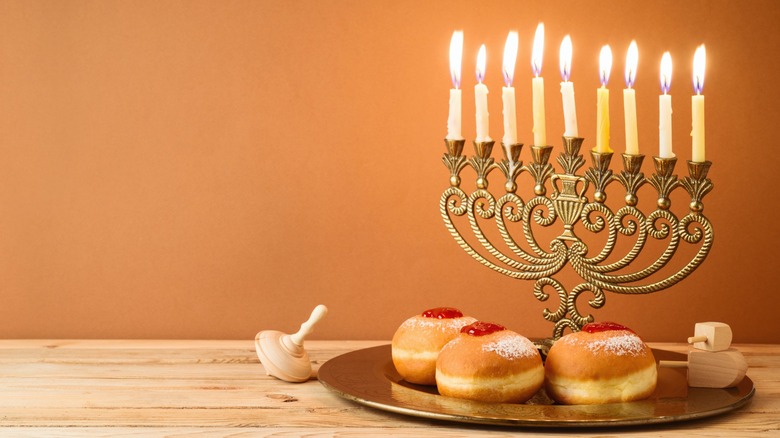Why We Eat So Many Fried Foods For Hanukkah
There are two foods you're almost certain to encounter at a Hanukkah dinner: fried shredded potato pancakes known as latkes, and sufganiyot, which are jelly or custard-filled donuts. Other items you might see on the table include various fried pastries, fried fish, and even fried chicken. Noticing a pattern? These delicious treats all get the deep-fried treatment. This contrasts with the Jewish high holiday menus for Yom Kippur or Rosh Hashanah, which often have brisket, fresh fruit like apples and pomegranates, and non-fried fish such as lox. So what gives with all of the fried goodness at Hanukkah?
That goes back to the actual story of Hanukkah, the festival of lights, which celebrates a miracle that occurred over 2,000 years ago. After ousting an oppressive king, Jewish rebels recovered a religiously significant temple. According to the Talmud, when they went to light the menorah as part of the rededication, they realized there was only enough oil to keep the flame lit for a single night. But the flame didn't go out and lasted for a total of eight days and nights, which gave them time to find more oil. That's why the festival of lights is just as much a celebration of oil.
From candle light to dinnertime delight
Not sure how we get from an ancient temple to eating the delicious delicacy that is latkes? It all comes down to what these treats are fried up in — oil. By making deep-fried foods, we pay homage to the abundance of oil provided to the Jewish people all those centuries ago. Especially as oil-fueled menorahs have become less popular in favor of candles, it's important to pay tribute to the oil in the food served during the holiday.
In the Hanukkah story, the Maccabees used olive oil to light the menorah, which isn't really what we use as a light fuel anymore, and it definitely isn't what we deep fry with. That's because olive oil has a low smoke point, which can turn your kitchen into a smokehouse. Instead, when you fry up Hanukkah dinner, try a neutral oil like vegetable, grapeseed, or canola oil, ensuring that it's kosher, of course. Save the olive oil for the salad dressing. With a holiday filled with symbolism, it's probably okay to take a few liberties when it comes to what you'll actually be eating.

